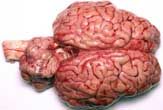Reliving Her Successes and Suffering Through Her Failures All Over Again
Nosotros Learn More than from Success than Failure

We learn from our mistakes, right? Well, maybe not every bit much as we learn from our successes, co-ordinate to a new written report. The research, done on monkeys, suggests that the brain neurons involved in learning may process information more finer later on a success than after a failure, which in turn leads to an improvement in behavior. The study looked at neural changes in the monkeys' brains as they learned a specific task. The animals were shown pictures every few seconds and had to expect either left or right depending on the image they saw. They learned by trial-and-error which image was associated with looking in a item direction, and they were rewarded if they chose correctly. The researchers monitored neurons in the monkey's prefrontal cortex and the basal ganglia — ii areas of the encephalon thought to be involved in learning. They found that neurons in these brain areas are indeed important for learning — they "keep rail of contempo successes and failures," said Earl K. Miller, a researcher at MIT's Picower Institute for Learning and Retentivity. But what surprised the researchers was that these neurons really became more "finely tuned" after a correct response than afterward an incorrect response, meaning that the neurons were able to better distinguish betwixt the 2 different associations that the monkey was learning.
"The neurons in these areas ameliorate their tuning, they acquire better when the creature had a recent success, versus when the animal had a failure," Miller said. "When the animal had a failure, there was almost no modify in neural processing, the neurons didn't better at all."
In applied terms, later on a success the monkeys were more than likely to get an answer right on the next trial, indicating a link between the improved neuron activeness and the brute's behavior.
Previous research has shown that in that location is some very transient activity in these brain areas during learning, lasting merely a few milliseconds. Just scientist did not empathise how this curt-lived activeness could influence the brute'south beliefs since trials are typically a few seconds apart. This study showed that the learning-associated neural signals actually lasted for several seconds.
"By careful examination of this neural activity, nosotros [found] the signal does in fact linger, information technology lingers on for multiple seconds, long enough to exist the bridge betwixt the feedback the animal got from the environs and the very adjacent learning episode," Miller said.
Further experiments will need to be carried out to notice out how the sustained neural signals relate to the previously identified transient activeness. "These transient responses might be the initial betoken that kicks off the sustained response, [but] we don't know yet," Miller said.
Learning more from success than failure would perhaps explain why nosotros sometimes echo mistakes. But this inquiry seems to contradict the results of previous studies that advise we do learn from our mistakes. However, this supposition is not necessarily true, since what we learn depends on the type of mistake, according to Miller.
"There's lots of dissimilar types of learning, and when you say learning from mistakes, the question is what is the nature of the error," Miller said.
"In our study, the situation was a advantage versus no advantage, success versus the absence of success … but there's some cases where mistakes tin can actually lead to very bad negative consequences, like a loss of money, or loss of a scholarship. When the failure actually leads to a negative event rather than simply the absence of a positive, that might engage learning mechanisms that rely on feedback from that negative consequence, so maybe it's a different situation," he said.
The results were published in the July xxx issue of the journal Neuron.
- Five Ways to Beef Up Your Encephalon
- Encephalon'south Potential Explained by Big New Idea
- All Most the Brain
Source: https://www.livescience.com/10559-learn-success-failure.html

0 Response to "Reliving Her Successes and Suffering Through Her Failures All Over Again"
Post a Comment